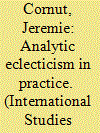| Srl | Item |
| 1 |
ID:
137606


|
|
|
|
|
| Summary/Abstract |
The relation of different theoretical approaches to one another is a disquieting question in International Relations (IR). Building on recent scholarship addressing the logic of questions and the analytical tools the scholarship provides for investigating the contributions of different explanations this piece argues that any and all explanations are an answer to a contrastive why-question. First, the article presents the objections to eclecticism. It then reviews the application of the logic of questions to IR and develops a “contrast theory” clarifying this logic: Seeking an explanation means delimiting a contrast space within a specific interrogatory context. The article lastly shows how these concepts help in thinking about post-foundational science of IR, that is, a science with no universal epistemological foundation to knowledge. I argue that the pragmatic, problem-driven and complexity-sensitive research agendas are a stronger foundation than currently predominant conceptualizations. An example, drawn from Iran's attempts to acquire nuclear weapons, helps illustrate the value-added by a logic of questions approach
|
|
|
|
|
|
|
|
|
|
|
|
|
|
|
|
| 2 |
ID:
190981


|
|
|
|
|
| Summary/Abstract |
This article investigates the socio-linguistic and pragmatic functions of Jordanian political humour after the Arab Spring revolutions from the perspective of Mikhail Bakhtin’s theory of carnival and the carnivalesque (folk humour). The analysis undertaken here of Jordanian political humour reveals a peculiar use of carnivalesque political humour via the use of humour as a socio-linguistic and pragmatic device that allows the ridicule of the government but not of the monarch. This occurs through the use of (1) conversational implicature, (2) rhetorical question, (3) malapropism, (4) taboo language and (5) reference and inference. This humour appears to be a form of ‘licensed disruption,’ an idea that is used extensively by some scholars of Bakhtin to talk about the popular politics of resistance and its limits and targets – what can and cannot be said within legal frameworks and societal expectations. Such humour, I found, has constantly called for reform of the government but not for regime change or revolution and has led to significant socio-political changes in Jordanian society, through which people are more willing to criticise and mock the government in social media platforms, such as Facebook.
|
|
|
|
|
|
|
|
|
|
|
|
|
|
|
|